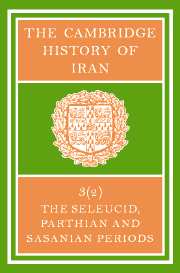29(a) - SASANIAN ART
from PART 7 - ART HISTORY
Published online by Cambridge University Press: 28 March 2008
Summary
INTRODUCTION
The art of the Sasanian period begins, officially, with Ardashīr's accession to the throne of the last Parthian ruler of Iran at Ctesiphon in the year a.d. 226. In fact, however, it already had its genesis in the art produced in Fārs under the kings of Persis well before that date. Ardashīr, it will be seen, had built a city and the first “Sasanian” palace at Firūzābād before, perhaps as a prelude to, his defeat of the Parthians, and the first coinage of his new dynasty followed closely that which he had issued at Stakhr while still a Parthian vassal.
During the nearly four and a half centuries of Sasanian rule in Iran, as with the previous five and a half centuries discussed by Professor Daniel Schlumberger in the foregoing chapter, coins are the only art form that can be traced in unbroken continuity. In establishing his first Sasanian coinage Ardashīr sought to reaffirm and express the connection of his dynasty with its Iranian past. Although in his earliest coins there is still a certain dependence in the portrait style and the helmet headdress on Parthian prototypes, a clear break with the Hellenistic coinage traditions was manifest by the replacement of the former divine figures on the reverse with the Zoroastrian fire altar and by the substitution of Pahlavī for Greek in the legends. In his later coins the portrait is modified, evidently individualized, and the head-dress is replaced by a more elaborate Sasanian version incorporating the mural crown and later is replaced by the mural crown alone.
- Type
- Chapter
- Information
- The Cambridge History of IranSeleucid Parthian, pp. 1055 - 1112Publisher: Cambridge University PressPrint publication year: 1983
References
- 6
- Cited by

